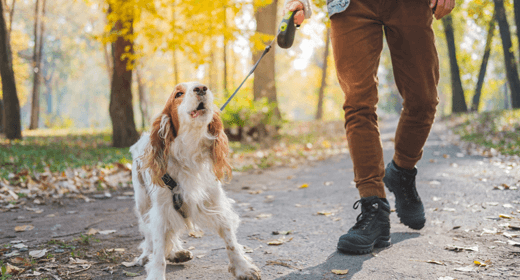

Adrena Wilhelm from Canine Companions for Independence shows you how you can teach your dog to speak and be quiet on command. She also provides effective techniques for teaching your dog to not bark when the doorbell rings and when other dogs are near.
Hi. I'm Adrena Wilhelm from Canine Companions for Independence on behalf of IAMS. Today, we're going to learn how to teach your dog to stop barking. It may sound nonsensical. But to stop your dog from barking, first, teach him to bark on command. Give your dog the command to speak. Have someone immediately make a noise, such as knocking on the door that is sure to make your dog bark. Let him bark two or three times. Then, stick a tasty treat in front of his nose. When he stops barking to sniff the treat, praise him and give him the treat. Repeat until he starts barking as soon as you say speak. Once your dog can reliably bark on command, move on to the quiet command. Teach your dog that barking is OK until told to be quiet. Simultaneously, hold a treat in front of your dog's nose. Most dogs get quiet immediately because they can't sniff and lick the treat while barking at the same time. Praise your dog continuously during his quiet time with petting and words of encouragement. When your dog makes a mistake and barks, and he will, reprimand him immediately. Never strike your dog, but do something that will catch his attention, such as clapping loudly. As soon as your dog stops barking, you must instantly reward him. If you're still having trouble, then you may need to spend some time working with your dog on specific barking situations. Here are a few of the more common ones. If your dog is in his crate or confined to a room behind a baby gate or other barrier, he may bark because he wants to be with you. But if that's not always possible, then you'll need to train him to stay quiet. Next time, he's barking uncontrollably in his more confined space, try this. Start by turning your back and ignoring him. Whenever he stops barking, turn and praise him. Give him a treat and make a game of it. As he catches on that being quiet gets him a treat, lengthen the amount of time that he must remain quiet before being rewarded. Dogs that are afraid of other dogs will often bark at them. Have a friend with a dog stand out of sight far enough away that you know your dog won't bark at the other dog. As soon as the friend and dog come into view, start feeding your dog lots of treats. Keep feeding treats until the friend and dog are out of sight. Ask your friend and her dog to gradually walk closer. Don't try to progress too quickly. It may take days or weeks before your dog can pay attention to you and the treats without barking at the other dog. When the doorbell rings, your dog alerts you to the presence of an intruder by barking wildly. Once you've taught your dog the quiet command in a calm environment, practice in increasingly distracting situations. Teach your dog to react to the doorbell by going to a special place and laying quietly while the intruder comes into the house. Start by tossing a treat on his mat and telling him go to your place. Have him go to his place before you give him the treat. When he's reliably going to his mat to earn a treat, up the ante by opening the door while he's on his mat. If he gets up, close the door immediately. Repeat until he stays on the mat while the door is open. Then, increase the difficulty by having someone ring the doorbell while your dog is on his mat. Reward him if he stays in his place. Try these techniques to stop your dog from barking. All of them can be successful, but don't expect miracles overnight. The longer your dog has been practicing the barking behavior, the longer it will take for him to change his ways. Let's recap. First, teach your dog to speak or bark on command. Once he has that down, teach him to be quiet on command. Use treats and praise to help get the desired outcome. And lastly, be patient and consistent in training. Don't expect overnight changes. I'm Adrena Wilhelm on behalf of IAMS. To join the IAMS community for more information and offers, check out the website.


It is a sight no dog owner wants to see – your beloved pet heaving and uncomfortable, its body racked with nausea. For many, the sound of a dog vomiting sets off alarm bells. But why do dogs vomit, and what causes an upset stomach in dogs? More importantly, when is a dog's upset stomach merely a passing concern, and when does it indicate a more serious issue? Let's delve into these questions to better understand our four-legged friends' health.
Vomiting in dogs is a common occurrence and can be triggered by various factors. This process involves the forceful ejection of the contents within a dog's stomach or upper intestine. This action is often preceded by signs of nausea, such as drooling, licking lips, and swallowing excessively. Sometimes, the cause of vomiting is fairly benign – your dog may have just eaten too quickly or consumed something that didn't agree with its stomach. In other instances, it could be a sign of something more serious, such as ingestion of a toxic substance or a serious illness.
The reasons behind a dog's upset stomach are varied and can range from mild to severe. Upset stomach, medically termed as gastroenteritis, is caused by inflammation or irritation in the stomach or intestines. This can be triggered by a sudden change in diet, food intolerances, ingestion of foreign substances, bacterial or viral infections, and even serious conditions like pancreatitis or kidney failure.
One common mistake dog parents make is confusing vomiting with regurgitation. When a dog regurgitates, it's typically soon after eating and is a passive process, where undigested food comes up without much effort. On the other hand, vomiting involves active abdominal contractions and results in the expulsion of partially digested food mixed with bile.
Any dog owner knows that an upset stomach can leave their furry friend feeling less than their best. Recognizing the signs of an upset stomach can help in providing prompt care and relief for your pet. Typical symptoms include:
More serious signs include:
If your dog appears to be in pain, loses appetite, shows signs of dehydration, has a fever, or exhibits unusual behaviours such as lethargy, restlessness, or shivering, it's a clear indication that something is wrong.
In extreme cases, an upset stomach can result in weight loss and frequent vomiting in dogs, which can be a sign of serious medical conditions such as liver or kidney disease, pancreatitis, or even cancer. It is also important to monitor stress in your dog, as this can often exacerbate or trigger stomach issues.
When it comes to treating a dog's upset stomach, the appropriate treatment will largely depend on the underlying cause. If it's a mild case, such as a dietary change or eating too quickly, simple home remedies might be sufficient. However, if the condition persists or is associated with other serious symptoms, it's essential to consult with a vet.
Some common dog vomiting treatments are:
The best remedies for your dog’s upset stomach are probiotics such as IAMS™ Proactive Health™ Digestive Health Supplement and pumpkin, which can aid digestion. However, it's essential to remember that these are not cures but temporary solutions. If your dog continues to vomit or display signs of an upset stomach, a trip to the vet is necessary.
It's essential to remember that while some instances of dog vomiting or upset stomach can be managed at home, more frequent or severe symptoms necessitate a visit to the vet. Early detection of symptoms can make a significant difference in your dog's health. If your dog vomits multiple times in a day, shows no signs of improvement after 24 hours, or frequently throws up mucus, it's time to take your pet to the vet. The age and overall health of your dog also play a crucial role in this decision.
While home-cooked foods like skinless chicken, boiled potatoes, or rice can be good short-term options for a dog with an upset stomach, they are not nutritionally complete for long-term care. It's also crucial to avoid feeding your dog raw food, which can contain harmful germs like salmonella. Always follow your vet's recommendations to ensure your dog's health and safety.
In addition to following your vet's advice, consider integrating a digestive health supplement into your dog's diet. IAMS™ Proactive Health™ Digestive Health Supplement is a soft, chewable supplement that combines prebiotics and probiotics to regulate your dog's gut health. It contains no artificial colour, flavour, preservatives, or fillers, making it a safe and effective choice for enhancing your dog's digestive health.
Understanding the causes, symptoms, and treatments of dog vomiting and upset stomach, and consulting with a vet, when necessary, can help ensure your furry friend's well-being. Remember, their health is in your hands.